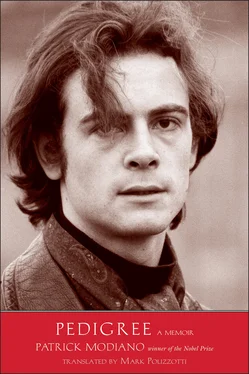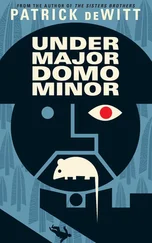D. would marry a female racing driver and end his days ruined: as manager of a nightclub in Hammamet, then as garage owner in Bordeaux. For his part, my father would stay true to his Colombian dream for a few more years. In 1976, a friend sent me a document bearing this information: “Compagnie Financière Mocupia. Head office: 22 Rue Bergère, Paris 9. Tel. 770-76-94. French corporation. Board of Directors: President: Albert Rodolphe Modiano. Board: Charles Ruschewey, Léon-Michel Tesson … Kaffir Trust (Raoul Melenotte).”
I was able to identify the members of this board of directors — starting with Tesson, in September 1972, when a telegram from Tangier was mistakenly delivered to me instead of my father: 1194 TANGIER 34601 URGENT SETTLE RENT BERGERE — STOP — MY SECRETARY LAID UP — STOP. REPLY URGENT TESSON. This Tesson was a financier in Tangier. As for Melenotte of the Kaffir Trust, he had been a member of the multinational administration of free zones.
In the years 1963 and 1964, I also met a third man from the board of directors, Charles Ruschewey. My father, hoping to dissuade me from pursuing an overly “liberal” education, pointed as an example of failure to this Charles Ruschewey, who had been in the prestigious khâgne program at Louis-le-Grand with Roger Vailland and Robert Brasillach, and who had never amounted to anything. Physically, he was like a clergyman in civvies, a dirty-minded, beer-swilling Swiss with steel-rimmed glasses and fleshy lips, the type who’d secretly frequent the “slags” of Geneva. In his fifties and divorced, he was living with a plump, shorthaired woman younger than he, in a windowless ground-floor room in the 16th arrondissement. He must have served as my father’s factotum and “sidekick.” He looked like someone who would compromise his principles at the drop of a hat, which didn’t stop him from lecturing me with a pedantry worthy of Tartuffe. In 1976, I would run into him on the stairs at Quai de Conti, aged and puffy-faced and looking like a derelict, shopping bag dangling from a sleepwalker’s arm. And I noticed he was living in the fourth-floor apartment that my father had recently abandoned for Switzerland, though it contained not a stick of furniture and the heat, water, and electricity had all been cut off. He was squatting there with his wife. She sent him out to do the shopping — no doubt a few cans of food. She had become a real harpy: I could hear her screeching every time the poor man walked in the door. I don’t imagine he was living off his director’s fees from the Compagnie Mocupia anymore. In 1976, again in error, I received a report from that finance company, according to which “our corporate lawyer in Bogotá was instructed to file a claim for compensation in the Colombian courts. For reference, we inform you that Albert Modiano, the president of your board of directors, is a director of the South American Timber Company and represents our firm in this subsidiary.” But life is cruel and unfair, and it shatters the fondest dreams: the president of the board of directors would never receive any compensation from Bogotá.
Christmas 1962. I don’t remember whether there really was any snow that Christmas. In any case, in my mind I see it falling at night in heavy flakes on the road and the stables. I was met at the stud farm in Saint-Lô by Josée and Henri B. — Josée, the girl who used to look after me from ages eleven to fourteen, in my mother’s absence. Henri, her husband, was the farm veterinarian. They were my last resort.
Over the following years, I’d often return to their place in Saint-Lô. The city they called “capital of the ruins” had been flattened by bombardments during the Normandy invasion, and many survivors had lost all trace or proof of their identity. They were still rebuilding Saint-Lô into the 1950s. Near the stud farm, there was a zone of temporary workers’ huts. I would go to the Café du Balcon and the town library; sometimes Henri would take me to the neighboring farms, where he treated animals on call, even at night. And at night, thinking of all those horses standing guard around me or sleeping in their stalls, I was relieved that they, at least, would not be taken to the slaughterhouse, like the line of horses I had seen one morning at the Porte Brancion.
I made a few girlfriends in Saint-Lô. One lived at the power plant. Another, at eighteen, wanted to go to Paris and enroll in the Conservatory. She told me of her plans in a café near the train station. In the provinces, in Annecy, in Saint-Lô, it was still a time when every dream and nighttime stroll ended up at the station, where the train left for Paris.
I read Balzac’s Lost Illusions that Christmas of 1962. I was still living in the same room on the top floor of the house. Its window looked out onto the main road. I remember that every Sunday, at midnight, an Algerian walked up that road toward the workers’ huts, talking softly to himself. And this evening, forty years later, Saint-Lô reminds me of the lit window in The Crimson Curtain —as if I’d forgotten to turn off the light in my old room or in my youth. Barbey d’Aurevilly was born around there. I had once visited his former house.
Nineteen sixty-three. Nineteen sixty-four. The years blend together. Days of indolence, days of rain … Still, I sometimes entered a trancelike state in which I escaped the drabness, a mixture of giddiness and lethargy, like when you walk the streets in springtime after being up all night.
Nineteen sixty-four. I met a girl named Catherine in a café on Boulevard de la Gare, and she had the same grace and Parisian accent as Arletty. I remember the spring that year. The leaves on the chestnut trees along the elevated metro. Boulevard de la Gare, its squat houses not yet demolished.
My mother got a bit part in a play by François Billetdoux at the Théâtre de l’Ambigu: Comment va le monde, môssieu? Il tourne, môssieu … Boris Vian’s widow, Ursula Kübler, was also in the cast. She drove a red Morgan. Sometimes I went to visit her and her friend Hot d’Déé in Cité Véron. She showed me how she used to do the “bear dance” with Boris Vian. It moved me to see the complete set of Boris Vian’s records.
In July, I took refuge in Saint-Lô. Idle afternoons. I frequented the town library and met a blonde. She was spending her holidays in a villa in the hills of Trouville, with her kids and dogs. During the Occupation, when she was fourteen, she had lived at the Legion of Honor school in Saint-Denis. A “schoolgirl of old boarding-schools.” My mother wrote me: “If you’re happy there, it would be best if you stayed as long as possible. I’m living on practically nothing, and this way I can send the rest of the money I owe Galeries Lafayette.”
In September, in Saint-Lô, another letter from my mother: “I don’t think we’ll have any heating this winter, but we’ll manage. So I need you, my son, to send me all the money you have left.” At the time, I made a modest living by “brokering” used books. And in still another letter, a hopeful note: “The coming winter surely won’t be as harsh as the one we’ve been through …”
I received a phone call from my father. He had enrolled me, without asking, in advanced literature courses at the Lycée Michel-Montaigne in Bordeaux. He was, he said, “in charge of my schooling.” He made an appointment with me for the following day, at the cafeteria of the railway station in Caen. We took the first train for Paris. At Saint-Lazare, the ersatz Mylène Demongeot was waiting for us and drove us to the Gare d’Austerlitz. I realized that she was the one who had insisted on my exile, far from Paris. My father asked me to give the ersatz Mylène Demongeot, as a token of reconciliation, an amethyst ring I was wearing, a parting gift from my friend, the “schoolgirl of old boarding schools.” I refused.
Читать дальше












